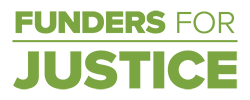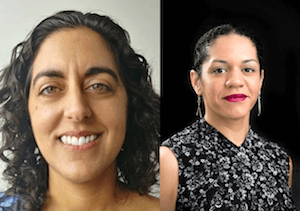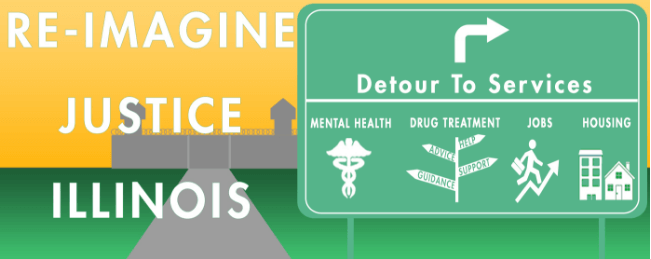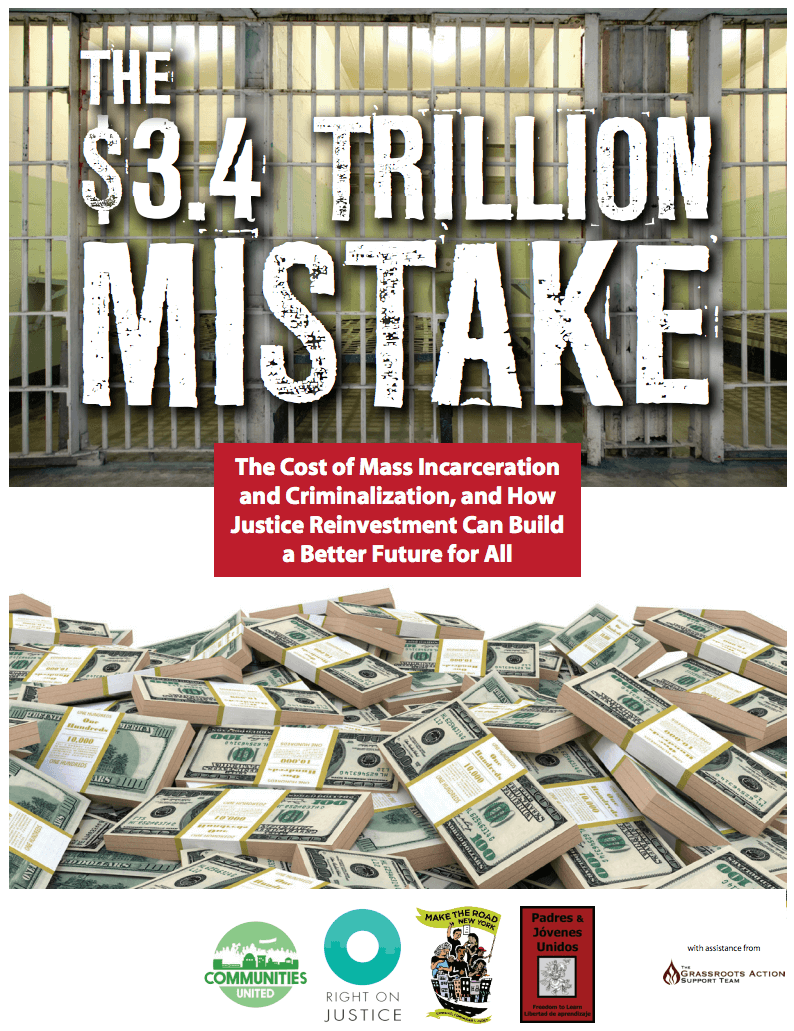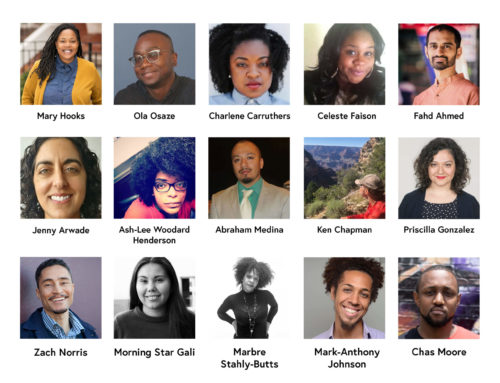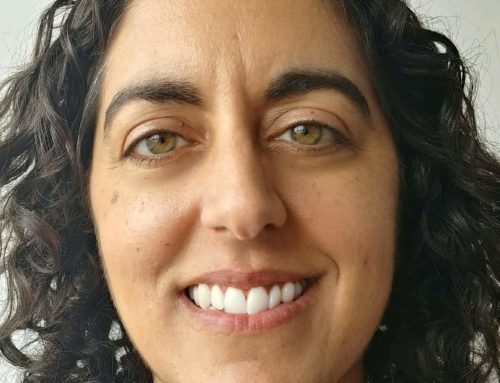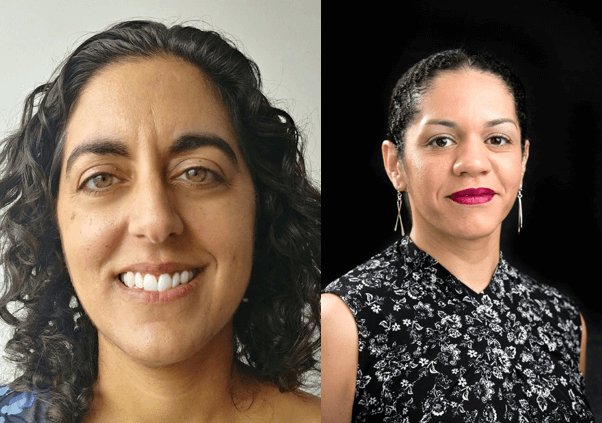
Left to Right: Jenny Arwade, Co-Executive Director at Communities United; Manuela Arciniegas, Associate Program Officer at the Andrus Family Fund.
Next up in our discussion series with FFJ’s Field Advisors, Manuela Arciniegas (Associate Program Officer at the Andrus Family Fund) interviews Jenny Arwade (FFJ Field Advisor and Co-Executive Director of Communities United). Read the interview below to learn more on how Communities United changing the narrative of reinvestment, leading the charge on invest/divest strategies and campaigns, and developing sustainable leadership at the helm of the social justice movement.
What are some of the ways Communities United is providing national leadership in social justice movements?
We’re best known for our work to dismantle the school-to-prison pipeline, but Communities United (CU) is leading the way on a number of fronts. All of our efforts bend toward holistic racial justice—we recognize that nobody is faced with a single-issue struggle.
CU convenes Voices of Youth in Chicago Education (VOYCE) through which youth of color worked for and won the nation’s most comprehensive statewide school discipline reform, SB100. This new law ends zero tolerance at all publicly-funded schools in Illinois, places stronger standards on the use of exclusionary discipline, and paves the way for restorative practices to take hold. Young people are currently organizing to ensure effective implementation in Black and Brown communities across the state. We’ve also secured ground-breaking policy change to prevent the displacement of renters from foreclosed buildings and preserve those buildings as long-term affordable housing. On healthcare, we’re working to expand access to care for the uninsured and underinsured in Cook County, including young adults, undocumented people, LGBTQ individuals, and the formerly incarcerated.
Several years ago we launched a statewide effort, Reimagine Justice Illinois, through which young people, survivors, and formerly incarcerated individuals have been organizing to advance community-led justice reinvestment efforts. We think it’s deep community investment that leads to transformation.
Can you talk about the recent report you co-authored and how the narrative of reinvestment is taking hold in the social justice movement?
We got a lot of traction with this national report I co-authored with Jim Freeman from the Grassroots Action Support Team, and allies from Padres Y Jovenes Unidos and Make the Road New York. It’s titled “The $3.4 Trillion Mistake: The Cost of Mass Incarceration and Criminalization and How Justice Reinvestment Can Bring a Better Future for All.” It’s been a powerful and motivating tool in communities with policymakers, allies, and all sorts of stakeholders.
Over the past 30 years there was $3.4 trillion in surplus justice spending across police, corrections, judicial/legal, and immigration enforcement. We wrote about what could be done with just one year of surplus justice spending, or $206 billion.
For example, it could have created over 1 million new living-wage jobs; provided 1 million new social workers, psychologists, conflict mediators, mental health drug counselors, and drug treatment counselors to address public health and safety issues; and created a universal pre- school system for all 3- and 4-year olds in the country that would be free for low-income families and affordable for middle class families.
Whether we’ve been talking with young people, faith leaders, or formerly incarcerated individuals, the idea of invest/divest has brought people to tears. The dominant narrative has focused on how communities have suffered chronic disinvestment which is devastating enough. Then to hear how many trillions of dollars have been invested in these same communities to incarcerate, deport, and tear apart families — it’s even more devastating in a way. But it’s also a game-changer in that it allows people to fight the age-old adage that there isn’t enough money to rejuvenate our communities. People can tangibly feel that the resources are there to fund all the things they want to see in their communities. It adds new energy and resolve to their movements to unlock and reinvest those resources.
The report has also allowed organizers to step back from their work and to hold a broader vision for transformative change, and to see new opportunities for movements to intersect to create the type of power that is needed to effect deep and lasting change.
To build on the release of the report, we have formed the Grassroots Alliance on Justice Reinvestment with our co-authors and with additional groups in Florida including Dream Defenders, Power U Center for Social Change and Community Justice Project. By convening and sharing strategies and narratives across states, we believe we will be able to move the needle on community-led justice reinvestment efforts.
Can you talk about how Communities United’s work on the invest/divest strategy and the recent campaign wins and lessons learned?
Our invest/divest strategies range from pushing for re-allocation of funds from school police into student supports to addressing gun violence in Chicago through a reinvestment lens. One example of recent success is that just a few months ago, young people from Communities United and our VOYCE alliance (Voices of Youth in Chicago Education) came just one vote shy of passing through the Illinois legislature what would have been a nationally groundbreaking policy change. The policy promoted divestment from school police and investment in restorative justice programs and other trauma-informed supports for young people, especially in schools and communities most heavily impacted by the school-to-prison pipeline. This would have been done through the creation of state-level financial incentives and a matching grant program to support schools in making this transition—for example, if schools decided to shift funds away from one school-based police officer, they would get double the funding that was devoted to that position to go toward school psychologists, counselors, or other trauma-informed programming. This would not only stem the school-to-prison pipeline, but would give schools and districts the resources to more effectively address student misbehavior and create positive school climates.
Right as young people were in the middle of bringing this back to Springfield and organizing to win, and the same day that their bill passed through the Illinois House Education Committee, the Parkland tragedy hit. As with other mass school shootings, we knew the collateral consequences could be devastating for communities of color which have been hit with more school police, as well as recent proposals to arm teachers… all in the name of “school safety.” Rather than addressing the root causes of violence, these approaches added rocket fuel to the school-to-prison pipeline.
But tragedies sometimes spark movements, and youth of color are refusing to allow the Parkland tragedy to have the same outcomes. Young people in our communities have been uniting and building movement with young people from Parkland and across the country. They are determined to continue forward movement on shifting resources from approaches that criminalize into approaches that restore and support young people.
Recently CU youth interacted with Parkland youth. Can you talk about what supports and knowledge CU youth were able to provide that you find is integral to changing the national conversation on youth and gun violence?
After the Parkland tragedy, young people from Communities United had the opportunity to travel to Parkland and meet with survivors from Marjorie Stoneman Douglas High School and share their common yet unique struggles with gun violence. They felt an instant connection because of the tragedies they have faced with gun violence and the loved ones lost.
In the words of youth leader Alex King, “When I saw what happened, it automatically hurt me as well as it hurt the Parkland students, because no one should be lost, especially in a place, an environment where you think that you should be the safest—in school.”
In the midst of the launch of March 4 Our Lives, CU youth joined with youth from Baltimore and Washington, D.C. to launch the Good Kids Mad City (#Goodkidsmadcity) movement to demand investments in youth employment, mental health resources, and trauma-informed schools to address root causes of gun violence and a youth vision for school safety in solidarity with the demands for gun control emerging from Parkland. These demands were not new, building off years of past organizing by young people around these issues, but the current moment provided a critical opportunity to elevate this platform and bring more people into the movement.
One of our youth leaders, Alex King, went on to be one of the speakers at the March 4 Our Lives rally in Washington, D.C., speaking to over a million people present about the need to come together as family as the movement continues. “Our pain makes us family. Us hurting together brings us closer together to fight for something better.” Sharing his experience losing his nephew to gun violence, and the trauma young people of color face on a daily basis in cities like Chicago, he shared the need to act with urgency to address gun violence as it impacts youth of color in cities across the country.
At the Chicago rally, CU leader Amina Henderson-Redwan was the closing speaker of the day, sharing her experience organizing fellow students to bring about reinvestment and resources to end gun violence. She shared the story of losing her father when she was nine years old, and again losing a loved one in February of this year. She reminded the crowd of over 80,000 people that youth in Chicago’s neighborhoods “have lost so many people that we can’t even count them anymore.” With 22 young people having been shot per month between September 2011 to April 2018, she demanded that solutions to gun violence in Chicago must go beyond gun control, but be rooted in strategies that invest in people rather than continuing the cycle of incarceration that has failed to create safer communities.
Recently, Alex King authored an Op-Ed featured in Teen Vogue, in response to the calls to “harden” schools. In his Op-ed, Alex brings to light how zero-tolerance policies have not resulted in safer schools or communities, and emphasizes the need for investment in education, employment, mental health as solutions to violence.
Can you share your insights on what it takes to develop sustainable, powerful leadership at the helm of the social justice movement? Are there any reflections that are particular to your leadership development among youth of color? Among women? Around your own leadership? How can funders support?
Providing long-term general operating support is by far the most powerful way to develop sustainable powerful leadership at the helm of social justice movements, and this is true especially when we are talking about women, youth of color, and I’ve seen the impact in my own development. When foundations have given large grants over long periods of time with minimal reporting requirements it is a game changer. It allows us to really focus on building the types of movement and power that are necessary to change conditions in our communities. It allows us to take a leap of faith to organize toward a vision that we are often told is unachievable.
The times that I felt most supported as a woman of color in this work have been when I’ve gotten calls out of the blue by funders I am in partnership with who have believed in our work and organizing so much that they have made deep investments that we didn’t even ask for. When a funder is in such true partnership with us that they so intimately understand our vision and what we are fighting for, and what the resources are that are needed to get there—that is powerful. That is transformational.
As women of color, our commitment is to collective leadership. It’s about having vision, but it’s about getting the job done—whether it’s in our day-to-day lives, as mothers, or in the movement. Allies in philanthropy play a critical role in supporting our leadership in the field, but also in being a part of that collective of people that at the end of the day helps to magnify and be a part of the demand for change to the point that we see real changes in conditions in our lives, in our schools, and in our communities.
What should funders be doing in this moment to support social movements and lasting change?”
There’s no better way to support social movements and lasting change than to make sure resources get directly to the ground to those most directly impacted who are leading change in their communities. Grassroots-led efforts are critical to not only creating the initial demand for change, but building the power necessary to ensure long-term sustainable shifts in resources from systems that cause harm to systems that restore and support our communities. A great example of current movements under way is the work of the Grassroots Alliance for Justice Reinvestment and Good Kids Mad City. Through these intergenerational efforts, youth of color, formerly incarcerated individuals, and survivors of violence have been coming together to win tangible concrete reinvestment in schools and communities that moves the needle forward and paves the way for longer-term change.
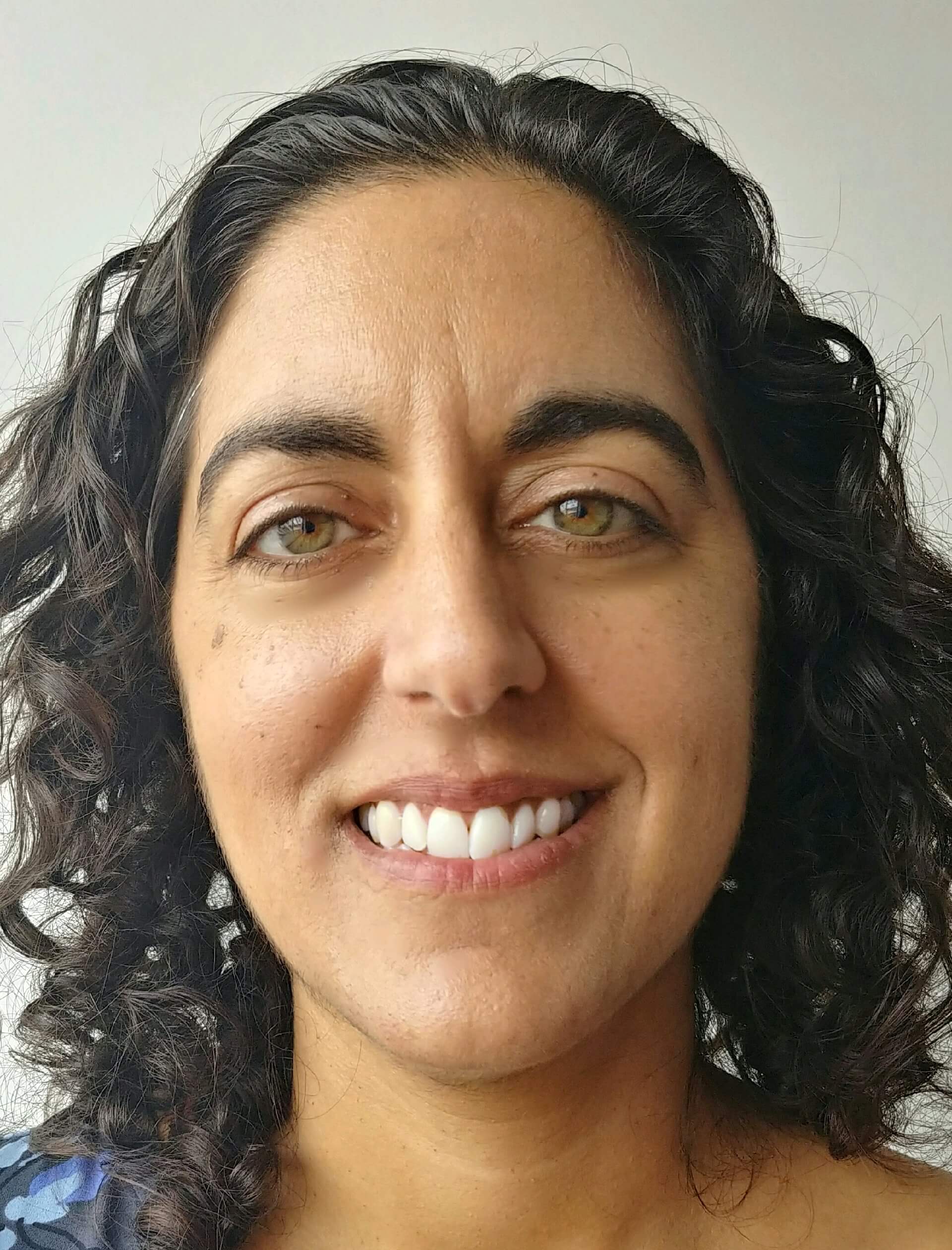 Jenny Arwade is Co-Executive Director of Chicago-based Communities United (CU), a racial justice organization which brings together young people and adult allies to advance social change and systems transformation. CU’s approach is centered on the creation of intentional healing and justice spaces, transformative civic engagement and leadership development approaches, and the development of broad-based alliances. Jenny has 17 years of organizing experience during which time she has supported young people and adult allies in creating the nation’s most comprehensive statewide school discipline reform, advancing strategies through an invest/divest framework to shift resources from police in schools and incarceration into school and community supports, and more. Jenny is a graduate of Princeton University, serves as Vice Chair of the Edward W. Hazen Foundation, and is a field representative on the Board of Advisors for the Funders’ Collaborative on Youth Organizing.
Jenny Arwade is Co-Executive Director of Chicago-based Communities United (CU), a racial justice organization which brings together young people and adult allies to advance social change and systems transformation. CU’s approach is centered on the creation of intentional healing and justice spaces, transformative civic engagement and leadership development approaches, and the development of broad-based alliances. Jenny has 17 years of organizing experience during which time she has supported young people and adult allies in creating the nation’s most comprehensive statewide school discipline reform, advancing strategies through an invest/divest framework to shift resources from police in schools and incarceration into school and community supports, and more. Jenny is a graduate of Princeton University, serves as Vice Chair of the Edward W. Hazen Foundation, and is a field representative on the Board of Advisors for the Funders’ Collaborative on Youth Organizing.
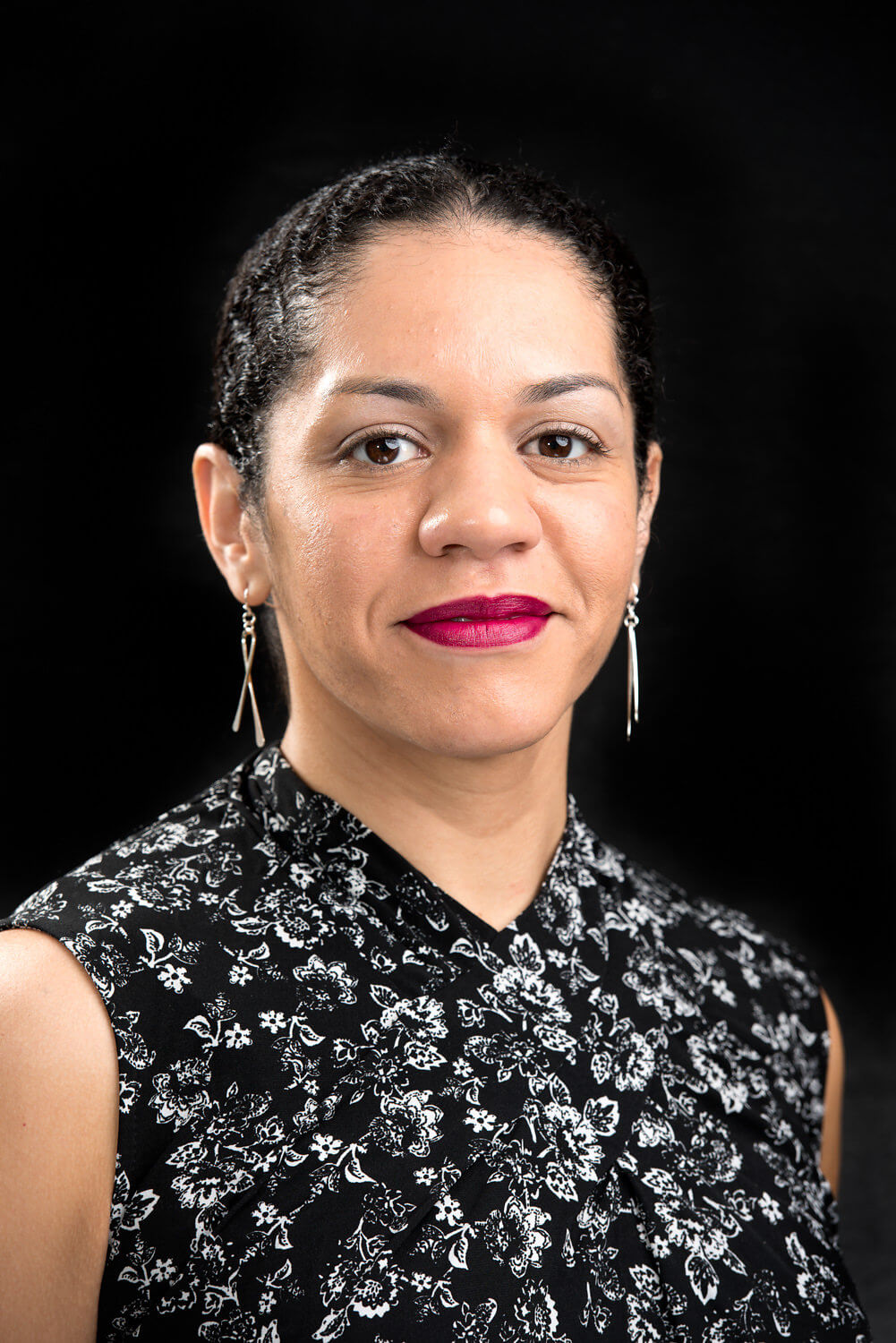 Manuela Arciniegas is the Associate Program Officer for the Andrus Family Fund, where she manages the capacity building initiative and a national community organizing portfolio serving youth impacted by juvenile justice, foster care, immigration detention, and other disruptive systems.
Manuela Arciniegas is the Associate Program Officer for the Andrus Family Fund, where she manages the capacity building initiative and a national community organizing portfolio serving youth impacted by juvenile justice, foster care, immigration detention, and other disruptive systems.
Manuela brings over 15 years of experience in social justice, community organizing, youth development, and cultural arts education. She is actively engaged in moving philanthropic resources with an eye towards improving leadership pipelines, civic engagement, systems’ wide reforms led by directly impacted youth through her membership on a number of funder advisory tables including the New York City Youth Funders, Emerging Practitioners in Philanthropy NYC Steering Committee, Funder’s Collaborative on Youth Organizing and the Youth Engagement Fund. She is currently conducting dissertation research for her PhD at the CUNY Graduate Center focusing on how Afro-Caribbean religious music creates power and cultural change. When not working at AFF Manuela directs The Legacy Women, a drum ensemble for women ages 23-55 that teaches and performs folk Afro-Caribbean music of resistance.
Manuela graduated cum laude with a Bachelors in Government from Harvard University.
In the spring of 2017, Funders for Justice (FFJ) launched its inaugural cohort of Advisors – nine field leaders recognized for their leadership in community power-building, racial and gender justice, police accountability campaigns, and anti-criminalization movements. We asked them to share their insights on the current political climate, how we can build a vision for the world we want, and what funders can do in this moment.
